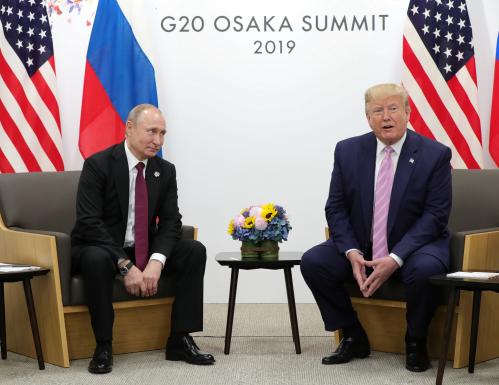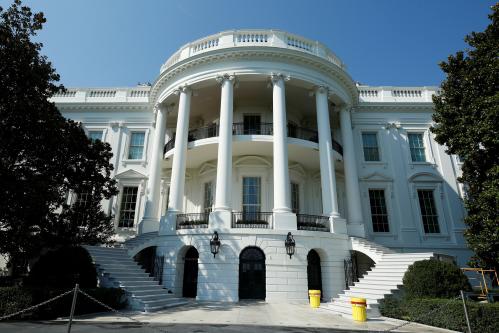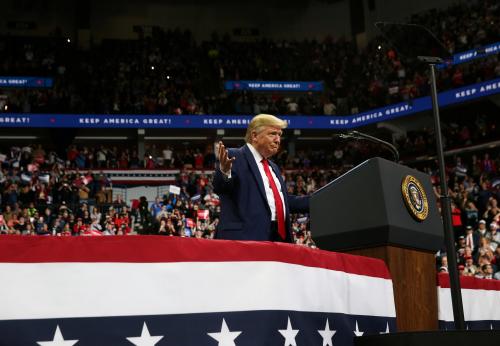“The Russians love it” could be the title of a movie about President Trump’s foreign policy. Ambassador Bill Taylor said it in a text message he sent about the withholding of military aid to Ukraine: “The nightmare is they [the Ukranians] give the interview and don’t get the security assistance. The Russians love it. (And I quit.)”
This week Democrats began formal public hearings on impeachment and yet another Trump associate was convicted of crimes. Most of the hearings were geared toward establishing whether or not President Trump’s role in a phone call to the Ukranian president constituted an abuse of power. The larger context of the hearings, from Taylor’s remarks to the transcript of Russia expert Fiona Hill, was Trump’s strange relationship with Russia. From the beginning of his campaign Trump and his associates have gone out of their way to do things that are in Russia’s interest. Of course, a president has every right to change foreign policy, but they usually go about it in a measured and systematic way—an address at someplace like Georgetown University, for example, and bolstered by support from political allies, scholars and foreign policy types.
But when it comes to what has been the American policy towards Russia, Trump has never tried to make a coherent case for change. From the beginning his fondness for Russia and its allies and his hostility to our own allies has mystified Democrats and Republicans alike.
And here’s where Ukraine comes in. Ukraine is a nation torn between Europe and Russia. In the 21st century Ukranian presidents have expressed support for joining the European Union and for NATO integration. Not to put too fine a point on it, this has driven the Russians nuts. In between February and March 2014, a thinly disguised Russian military offensive ended with the annexation of Crimea (part of Ukraine) to Russia.
International outrage was immediate. The United States and Europe objected and threw Russia out of the G8 group of nations. The United States allied itself with Ukraine and against Russia. However, the Obama administration did little in the way of punishing Russia other than economic sanctions, and Obama was criticized by Republican senators for his weak response.
But by 2016, it was clear that Trump—alone amongst the Republican presidential candidates—had a different view of Russia and the Ukraine. The first solid evidence came on July 11, 2016 when the Republican platform meeting began. Trump operatives moved to delete language from the platform that would call for “providing lethal defensive weapons” to the Ukraine and replace it with softer language calling for “appropriate assistance.” A few weeks later Trump gave an impromptu news conference from his golf course in Doral Florida. His suggestion that Russia find Hillary’s 30,000 emails made big news. But he also had a less-well-covered exchange about Crimea and Russia:
“QUESTION: I would like to know if you became president, would you recognize (inaudible) Crimea as Russian territory? And also if the U.S. would lift sanctions that are (inaudible)? TRUMP: We’ll be looking at that. Yeah, we’ll be looking.”
Later, during the Trump transition, some strange things happened. In early December 2016, Jared Kushner, Trump’s son-in-law and senior advisor, discussed the possibility of setting up a secret and secure communications channel between Trump’s transition team and the Kremlin, using Russian diplomatic facilities. The suggestion was relayed to Moscow and intercepted by U.S. intelligence agencies who monitor communications from Russian officials in the U.S. The Russian Ambassador was “taken aback,” since such an arrangement would have security risks for Moscow as well as for the Trump team.
What on earth could the Trump team want to hide from the American government?
About a week later, Michael Flynn, Trump’s designated national security advisor held conversations with Russian Ambassador about sanctions—a violation of the very firm rule that private citizens could not make U.S. foreign policy. Flynn was not yet in office. He later lied about it to Vice President Pence and was removed from office.
In May of 2017 Trump fired FBI Director James Comey in an attempt to shut down the investigation into Russian interference in the 2016 election. He followed this up with a meeting in the Oval Office with Russian Foreign Minister Sergei Lavrov and Russian Ambassador Kislyak in which he relayed highly classified information about an Israeli asset. A readout from the meeting was restricted to a very few officials. U.S. journalists were kept out of the meeting; the only photos come from Tass, the Russian news agency.
Why the secrecy?
A month later Trump had his very first meeting with Russian President Vladimir Putin in Hamburg, Germany. After the meeting Trump did something that was highly irregular. He took possession of the notes of his own interpreter and instructed the interpreter not to discuss what happened with other administration officials. Trump and Putin spoke again at a dinner for G-20 leaders joined only by Mr. Putin’s translator. There is no official record of what was said.
What was so sensitive that the rest of the government with responsibility for Russia could not hear?
Meanwhile, the Russia investigation was moving forward. On July 13, 2018 the Justice Department charged 12 Russian intelligence officers with hacking DNC emails, state election systems and others. Shortly thereafter, on July 18, Trump met with Putin in Helsinki. There he stated publicly that he believed Putin over his own intelligence agencies when Putin told him he didn’t interfere in the U.S. elections. Trump’s performance was called “One of the most disgraceful performances by an American President,” by the late Senator John McCain. His performance was panned outright by 13 other Republican senators and criticized by another 24 Republican senators.
On August 12, 2019 a whistleblower from the intelligence committee filed a complaint based on a phone call between President Trump and Ukrainian president Zelensky. This complaint led to the impeachment inquiry we are monitoring today. The substance of the complaint continues to be verified as Democrats call witnesses before the Congress.
And in November of 2019, as the congressional Republicans began to mount their defense of Trump, they chose to conjure up conspiracy theories about Ukraine’s ties to and sympathies for Hillary Clinton. These were provided by Trump’s jailed, former campaign manager and a former aid who had, in turn, gotten their information from Konstantin Kilimnik, a Russian with ties to Russian intelligence.
At her press conference following the first day of public hearings Speaker Nancy Pelosi brought the issue back to Russia. She pointed out that Putin benefits from a hold-up of military aid to Ukraine, Putin benefits when the United States withdraws from Northern Syria and Russia moves in, and Putin benefits when the United States pulls back from its NATO allies. The Ukraine quid pro quo is only the latest episode in a much larger drama in which, as the speaker said, “All roads lead to Putin.”
This work is licensed under the Creative Commons Attribution-NonCommerical-NoDerivatives 4.0 International License. To view a copy of the license, visit https://creativecommons.org/licenses/by-nc-nd/4.0/.







Commentary
“The Russians love it”: This week in impeachment
November 15, 2019